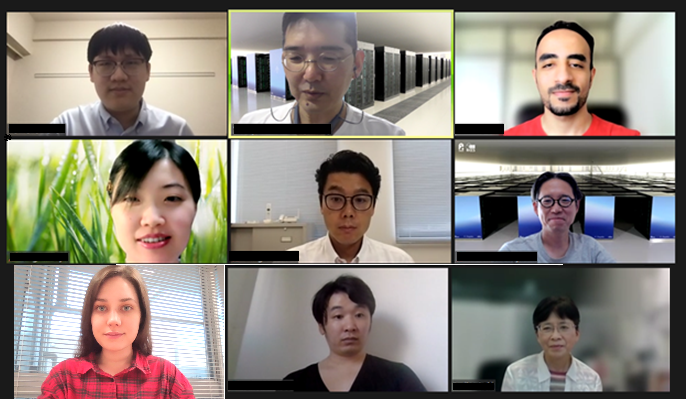TOP
 Events & Outreach
Events & Outreach
 Schools
Schools
 Report on International HPC Summer School 2021
Report on International HPC Summer School 2021
Report on International HPC Summer School 2021
JapaneseThough the International HPC Summer School was canceled in 2020 due to the COVID-19 pandemic, this year the program was able to be held online for those who were originally signed up to participate last year. The International HPC Summer School, a program for graduate students and young researchers interested in the HPC field, aims to develop young scientists who can lead future advances in the HPC field through cutting-edge seminars in a variety of fields, including the natural sciences and AI; hands-on sessions where participants can practice visualization and programming by using real large-scale computing equipment; and an electronic poster session presented by participants. Participants from Japan included 8 young scientists; distinguished lecturers Dr. Yuriko Aoki (Kyushu University, Interdisciplinary Graduate School of Engineering Sciences), Team Leader Makoto Tsubokura (RIKEN Center for Computational Science), and Team Leader Takemasa Miyoshi (RIKEN Center for Computational Science); and mentors Associate Professor Shugo Yasuda (University of Hyogo, Graduate School of Information Science), Team Leader Imamura Toshiyuki (RIKEN Center for Computational Science), and Dr. Takeshi Terao (RIKEN Center for Computational Science).
| Date | Sun, Jul 18 - Fri, Jul 30, 2021 |
|---|---|
| City | Online |
| Place | Online |
| Co-sponsored | XSEDE (USA), PRACE (Europe), SciNet HPC Consortium (Canada) |
To adapt the program to an online format for the first time, the School made arrangements so that everyone could participate in regular program activities, such as by dividing participants into groups based on their time zone (PDT+EDT and CEST+JPT groups). The School committee accommodated the time zone differences by converting each day’s lectures into a compact three hours and giving them twice over, once each for the Eurasian group and the North American group. Japanese and European participants were able to take part in School activities at the same time by logging on from 4 to 7 pm and 9 am to noon, respectively. The students appreciated the unexpected benefits of this arrangement, which included the ability to view multiple lectures because they were all video streamed the next day. The only truly unfortunate consequence of the time zone differences among participants was that the Eurasian group was unable to interact with the North American group due to the latter’s School times needing to accommodate multiple time zones across the east and west coasts of the continent.
The hands-on sessions featured opportunities to try parallel computing using MPI and OpenMP, standardized parallel programming; OpenACC, which uses accelerators; and Python programming. The participants’ enthusiasm for programming shone through as they worked on parallelization and acceleration. Their passion also came through during the Electronic Poster Session, where each participant presented their research; many continued their spirited discussions about each other’s work long after the session ended. We are also pleased to report that a student participating from Japan, Yen-Chen Chen (University of Tokyo), was crowned the Gold Winner of the Parallel Programming Challenge, where participants collaborate and compete with one another to tackle acceleration issues to improve performance on a shared problem, thanks to a program that uses multiple GPUs and combines OpenACC and MPI.
One special aspect of the School is its mentoring program, wherein a small group of participants is assigned to a mentor scientist, who offers the young scientists a listening ear and guidance on research life and future careers. This year, mentors and mentees met online using Gather Town throughout the program period, which gave participants the opportunity to discuss a range of topics, from technical content they were working on at the School to future research, with their mentors.
Comments from participants in the post-School survey mentioned some disappointment that participants were not able to meet in person, but also included positive perspectives on the online experience, such as, “The fact that it was online meant that I could participate at my own pace without having to interrupt my regular work, which was very helpful. My group’s time slot was from 4:00 p.m. (Japan time), which made it easy for me to make arrangements for work meetings.” Other comments included, “We met online through Gather Town this year, but I think the mentor system made it easier for me to talk with other participants as well as the mentors. I wish we had had more time to have exchanges with each other,” “I’d like to recommend the School to younger scientists in my lab,” and, “Even though my field is slightly different from the ones focused on in the School, I was able to learn a lot of knowledge that I hadn’t thought about before, and I feel that it broadened my perspective.”
Parallel Programming Challenge
Parallel Programming Challenge Gold Winner:
Chen,Yen-Chen (The University of Tokyo)
Comments on winning the IHPCSS2021 Challenge
The programming challenge is an exercise in IHPCSS for attendees to work at. Attendees are asked to parallelize a code with OpenMP (CPU) or OpenACC (GPU). This year, due to the new schedule and online attendance, we had a full week to work on the assigned task. I was fortunate to end up submitting the fastest code in OpenACC parallelization this year. I was not very familiar with OpenACC programming, so the programming challenge ended up being a perfect exercise for me. I learned a lot from the courses in IHPCSS and the practice through the programming challenge. I am really grateful for this wonderful opportunity to attend IHPCSS, and I urge future attendees to join the programming challenge actively.
(Oct 7, 2021)

